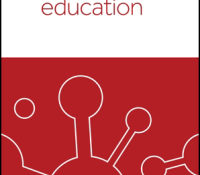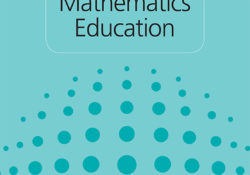eric.ed.gov har udgivet: This teacher’s guide was designed to accompany five student workbooks: Math Language, Understanding Word Problems, Using a Calculator, Estimation, and Solving Word Problems. The series was specifically developed for low achieving students. The teaching gradually progresses in difficulty, but concepts are presented in small chunks that students can successfully handle. Questions within the text repeatedly involve the students’ attention, and their learning is checked and reviewed within each lesson. Word problem situations reflect mathematical problems that students would actually do. Following suggestions for how to present and use the workbooks, the guide contains over 200 blackline master worksheets. A description at the bottom of each page states the concept being developed, and the corresponding unit and page in the student’s workbook. Separate introductions are provided for each… Continue Reading →
Like this:
Like Loading...
eric.ed.gov har udgivet: This report describes a program for improving elementary school students ability to solve mathematical word problems. The targeted population consisted of primary, middle, and junior high students attending two different kindergarten through eighth grade schools. Both schools were located within blue collar neighborhoods in a large metropolitan area. Students’ weakness in the area of problem solving was documented by teacher-made tests, journaling, standardized test scores, student surveys, and teacher surveys. Research literature and measurement tools revealed the following probable causes: inability to read story problems adequately; poor reading ability in general; improper strategy use; lack of strategy use; lack of desire to properly understand mathematical logic of problem; strategies that rely on memorization; insufficient instructional time spent on problem solving; and inadequate time spent on finding solutions.… Continue Reading →
Like this:
Like Loading...
eric.ed.gov har udgivet: In this lesson, students identify the question-answer relationship (QAR) for word problems that relate to a graphic or table. They then use the QAR strategy to determine the mathematical and cognitive actions required to answer the word problem. This activity is particularly appropriate for fourth- and fifth-grade students. During two 40-minute sessions, students will: preview tables to stimulate prior knowledge, make predictions, interact with print, and generate questions and answers about the content; understand that the format of a table supports comprehension of the relationship between data and the self-monitoring of responses to questions; practice analyzing word problems using the QAR strategy to predict a computation strategy and determine a response; understand that the type of question may indicate the need for different cognitive and mathematical actions;… Continue Reading →
Like this:
Like Loading...
tandfonline.com har udgivet en rapport under søgningen “Teacher Education Mathematics”: Link til kilde
Like this:
Like Loading...
eric.ed.gov har udgivet: In this study we analyze and contrast approaches that future high school math teachers show when solving word problems with the use of pencil and paper and later, with the use of a Dynamic Geometry System (DGS). The resources, representations, strategies and forms of mathematical reasoning that the participants exhibit when they use GeoGebra in the process of problem solving are analyzed. The results show that the use of the tool favors the dynamic exploration of the concepts involved, the formulation of conjectures and the search for different arguments to validate the solution. [This paper is provided in both Spanish and English. For the complete proceedings, see ED606531.] Link til kilde
Like this:
Like Loading...
eric.ed.gov har udgivet: The purpose of this study was to investigate the frequency with which students use math word problem strategies during and after schema-based instruction. It examines the extent to which students increase their ability to correctly solve word problems. It compares students’ attitudes toward mathematics problem solving before and after schema-based instruction. The study was conducted in a resource class with seven second-grade students on individualized education programs (IEPs). A single-subject research design was used. The schema-based instruction was implemented by the special education teacher in a small group setting. Students showed an increase in attempted and correct strategy use during instruction. Three students increased their attempts of strategy use from pretest to posttest, but only one student used the strategy correctly on all attempts. The mean problem-solving… Continue Reading →
Like this:
Like Loading...

tandfonline.com har udgivet en rapport under søgningen “Teacher Education Mathematics”: Abstract Abstract In third grade the focus on math word problems becomes prominent. In the limited third grade research, teacher-mediated explicit instruction with multiple exemplars, teaching students to use visual representations, and the incorporation of self-strategies, have proven effective. For these practices to reach their full potential though, their content must be relevant and provide for growth to mature mathematical concepts. Based on these conclusions, additional research was needed. Therefore, the focus of this study was to evaluate the effectiveness of a multi-component word problem-solving intervention with explicit instruction strategies, multiple exemplars, the teaching of student-generated visual representations, incorporation of a self-monitoring checklist, and Common Core State Standards’ appropriate curriculum. Within a multiple baseline across behaviors design, the study evaluated… Continue Reading →
Like this:
Like Loading...
tandfonline.com har udgivet en rapport under søgningen “Teacher Education Mathematics”: ABSTRACT ABSTRACT This article reports on a post hoc study using a randomised controlled trial with 31,842 students in the Netherlands and an instrument consisting of 21 paired problems. The trial showed a variability in the differences of students’ results in solving contextual mathematical problems with either a descriptive or a depictive representation of the problem situation. In this study the relation between this variability and two task characteristics is investigated: (1) complexity of the task representation; and (2) the content domain of the task. We found indications that differences in performance on descriptive and depictive representations of the problem situation are related to the content domain of the problems. One of the tentative conclusions is that for depicted problems… Continue Reading →
Like this:
Like Loading...
sciencedirect.com har udgivet: Highlights • Teachers’ written solutions to fraction multistep word problems were analyzed. • Teachers’ strategy and representations use moderately explained their solution correctness. • Teachers’ background characteristics accounted for little variance in solution correctness. • The use of informal strategies and representations were key to correct solutions. Abstract Examining teachers’ knowledge of fraction word problems is important in light of research demonstrating difficulties in both teaching and learning fractions and word problems involving fractions. This study examined fourth- and fifth-grade teachers’ (N = 350) written solutions to three fraction multistep word problems to unearth the salient factors contributive to performance on word problems. We found teachers’ strategies explain teachers’ success in solving word problems. In contrast, the characteristics of teachers’ backgrounds account for little variance in success in solving… Continue Reading →
Like this:
Like Loading...


